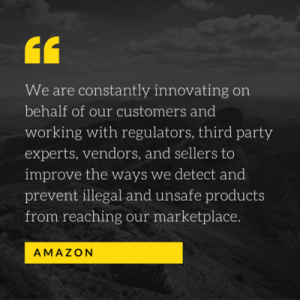Amazon Brand Gating Effects on Sellers: What's True and What's False?


Over the past several weeks, many resellers have seen this note from Amazon in their inbox:
Effective on 8/23, you will need approval to list the affected products on Amazon.com. If you do not obtain approval to sell these products prior to 8/30, your listings for these products will be removed….and only sellers approved to sell the affected products may send shipments of those products to fulfillment centers.
Amazon is protecting their customers and fighting counterfeiters by requiring brand-carrying resellers to:
There are a lot of rumors swirling about Amazon’s intentions and future plans. We’re here to shed some light on what’s true, and what’s false.
False. Amazon isn’t trying to cut out legitimate third-party sellers.
Right now, 50% of units sold by third-party sellers on the Amazon Marketplace. That’s a significant portion of Amazon’s profits, and it greatly increases the diversity of products available for customers.
Jeff Bezos acknowledges the value of the Marketplace for both customers and sellers: “[The] Marketplace is great for customers because it adds unique selection, and it’s great for sellers – there are over 70,000 entrepreneurs with sales of more than $100,000 a year selling on Amazon, and they’ve created over 600,000 new jobs.”

Contrary to popular belief (of most third-party sellers), Amazon isn’t anti-third-party. They’re just pro-customer. And counterfeit goods are not good for shoppers.
And with the holiday season approaching, Amazon doesn’t want their reputation to be on the line when your Aunt gets disappointed by a cheap knockoff of Chanel No. 5.
Pat Petriello, Senior Marketplace Strategist at CPC Strategy used to be a professional seller on Amazon.com and Amazon.co.uk, and he’s a former member of Amazon Seller Service Team.
In short, he’s been on both sides, and he sees this as a positive for both brands and customers.
“This is great news for shoppers and is yet another example of Amazon putting their customers first,” Petriello says. “It’s been no secret that inauthentic product reviews and low-quality knockoff products have created poor customer experiences in the past, and Amazon is now taking steps to clean up the marketplace and retain the consumer’s trust.
True. This is an obvious one—anyone who’s been paying attention to the news knows that the Amazon counterfeit problem hasn’t exactly been in control. Out of curiosity, we searched for the term “Amazon counterfeit” on Google Trends. This is what we saw:
Above chart explained by Google: Numbers represent search interest relative to the highest point on the chart for the given region and time. A value of 100 is the peak popularity for the term. A value of 50 means that the term is half as popular. Likewise a score of 0 means the term was less than 1% as popular as the peak.
Just one search for “Amazon Counterfeit” yields 573,000 results. Recognize any of these headlines? They all involve Amazon.
Even Amazon has had to protect themselves in court to ensure they’re not liable for “patent, copyright or trademark infringement when a third-party retailer uses its platform to sell counterfeit goods,” according to Geekwire.
Now, they’re taking steps to protect legitimate brands, resellers, and above all—customers.
True.
“What this will also do is continue to reduce the opportunity for merchants to resell other brand’s products and push them in the direction of exiting the marketplace or developing their own private labels,” Petriello explains.
One Redditor acknowledges this shift toward wholesalers and larger distributors in a comment:
Comment
by from discussion
inFlipping
Resellers that will make it will likely be much larger and more diversified in their offerings, and everyone else will need to get more creative or move onto other ecommerce sites.
False—most likely.

Though Amazon will require sellers to provide a written release to sell a brand’s products, our experts speculate they probably won’t pay attention to the brand’s selling platform restrictions.
“Mainly, the fact that the products aren’t counterfeit is all that matters to Amazon,” says Petriello.
If you’re a brand owner currently dealing with unauthorized resellers on Amazon, check out our post on the subject: Brand Protection On Amazon Against Unauthorized Sellers.
False–for now.
One of the first articles on MSN about Brand Gating on Amazon brings up another worry for sellers on Amazon’s marketplace: the elimination of retail arbitrage:
The many businesses that shop around for liquidation and clearance sales and turn around and sell items for higher prices on Amazon now have to consider what happens if the e-retailer only allows listings that come from authorized resellers.
Brands will benefit most from this change, but honest big resellers and distributors may also come out fine after paying fees and applying to pass through the brand gate.
Smaller Amazon sellers, on the other hand, may want to keep a strategic mindset and consider going into private labeling or expand into other selling platforms if they can’t afford to stock branded products.
